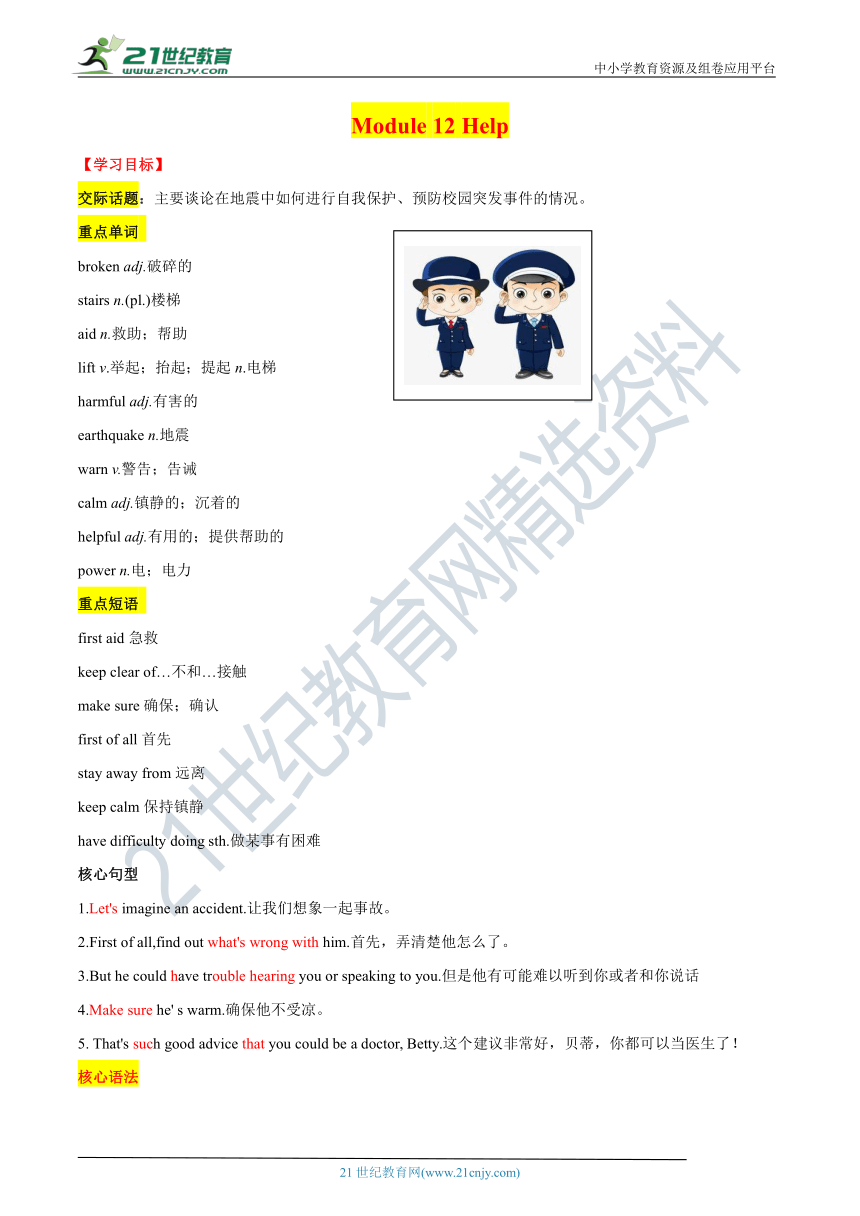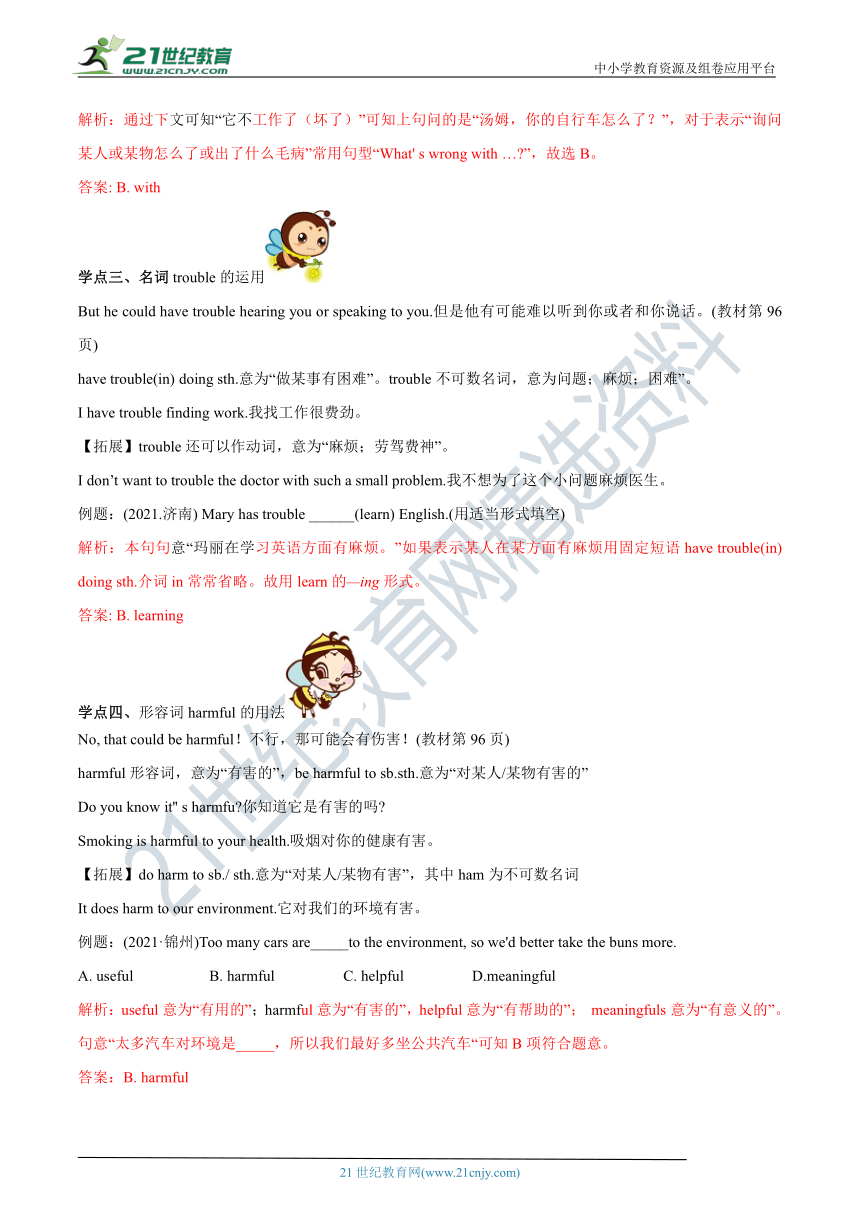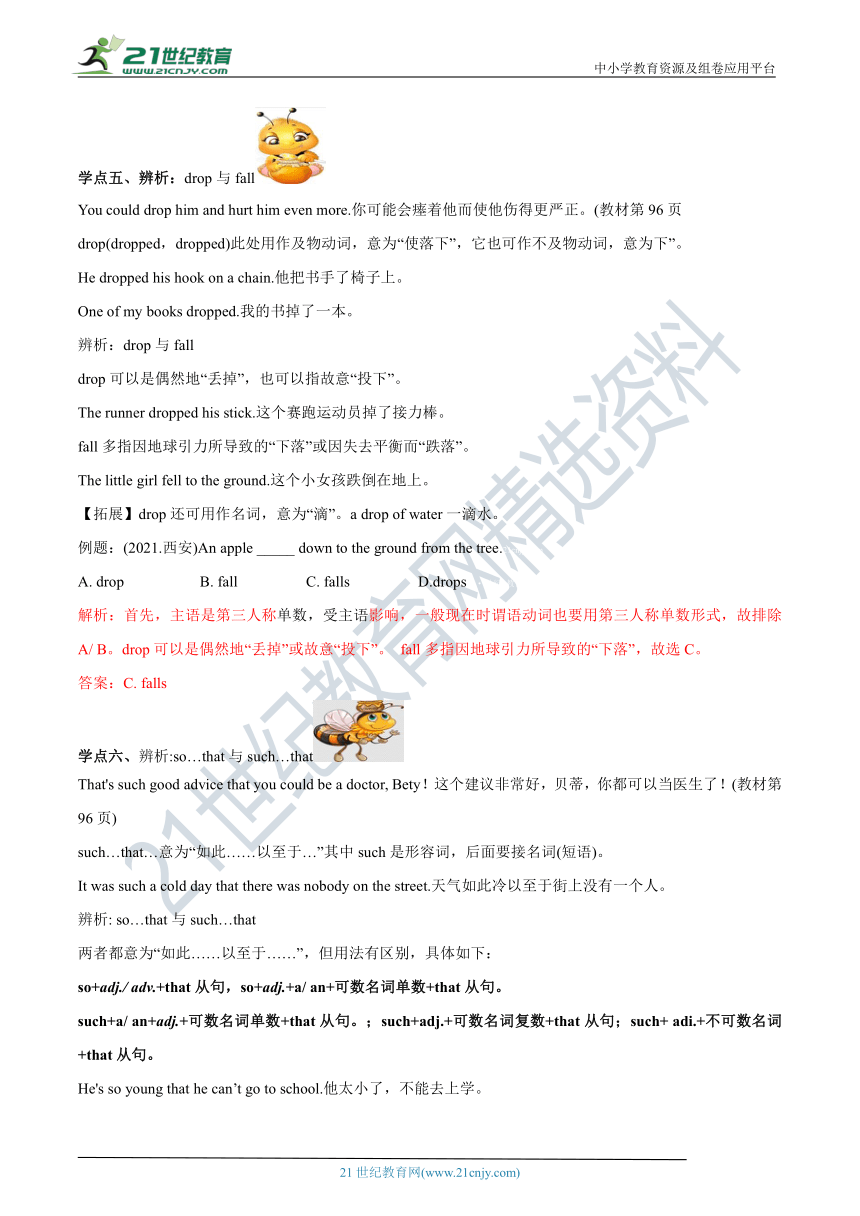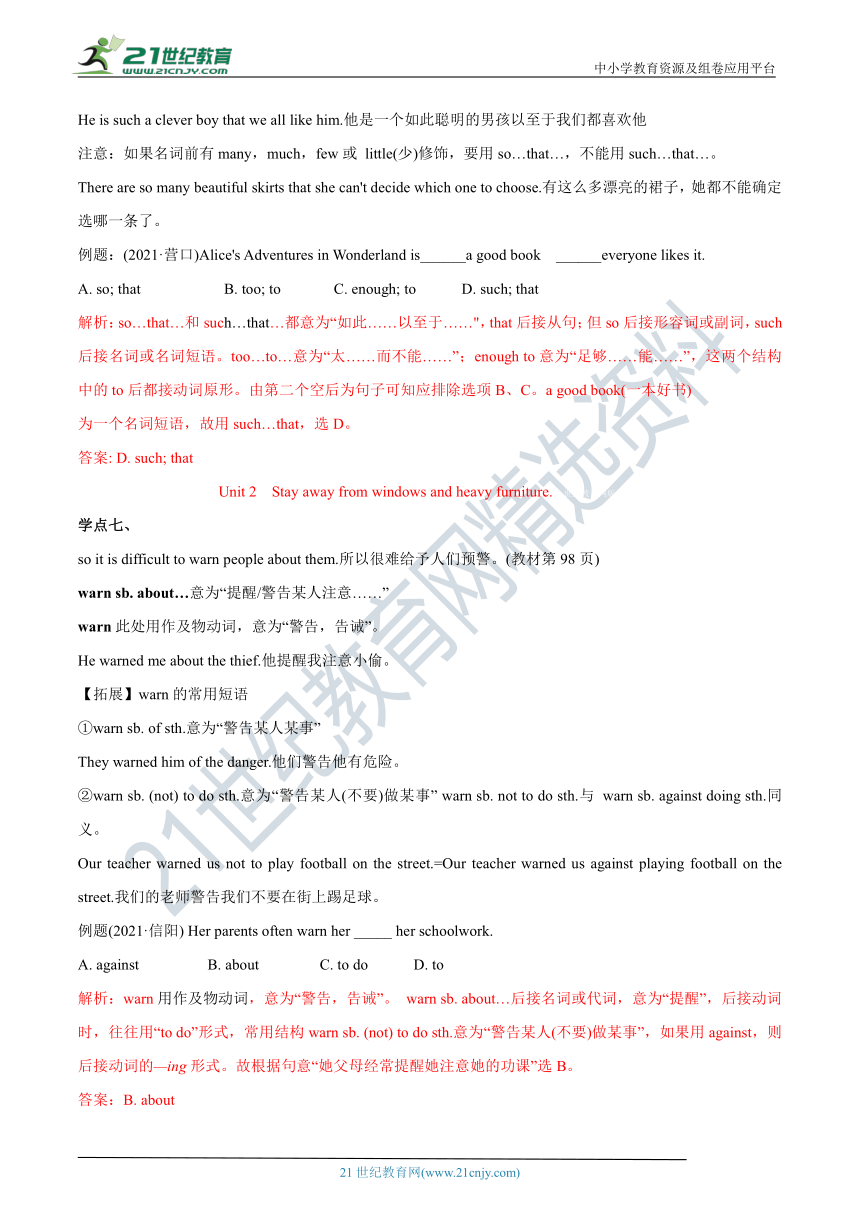Module 12 Help新知讲解学案
图片预览





文档简介
中小学教育资源及组卷应用平台
Module 12 Help
【学习目标】
交际话题:主要谈论在地震中如何进行自我保护、预防校园突发事件的情况。
重点单词
broken adj.破碎的
stairs n.(pl.)楼梯
aid n.救助;帮助
lift v.举起;抬起;提起n.电梯
harmful adj.有害的
earthquake n.地震
warn v.警告;告诫
calm adj.镇静的;沉着的
helpful adj.有用的;提供帮助的
power n.电;电力
重点短语
first aid急救
keep clear of…不和…接触
make sure确保;确认
first of all首先
stay away from远离
keep calm保持镇静
have difficulty doing sth.做某事有困难
核心句型
1.Let's imagine an accident.让我们想象一起事故。
2.First of all,find out what's wrong with him.首先,弄清楚他怎么了。www.21-cn-jy.com
3.But he could h_ave_tr_ouble hearing you or speaking to you.但是他有可能难以听到你或者和你说话
4.Make sure he' s warm.确保他不受凉。
5. That's suc_h_good_ advice that you could be a doctor, Betty.这个建议非常好,贝蒂,你都可以当医生了!
核心语法
1.祈使句的四种句式
2.情态动词can,must, could表示推测
Unit 1 What should we do before help arrives?
教材新知讲解
学点一、broken碎的(教村第96页)
broken用作形容词,意为“破碎的;坏的;不能使用的。
The foor was covered with broken glass.地板上满是碎政璃。
My computer is broken.我的电脑坏了。
【拓展】break作动词,意为“(使)破碎;意为”(使)破碎;(使)断裂”,其过去式为broke,过去分词为broken。
Who broke the window?谁打破了窗户?
例题:(2021.大连)My bike______It will be fixed tomorrow.【来源:21·世纪·教育·网】
A. new B. light C. dirty D.broken
解析:new意为“新的”;light意为“轻的”;dirty意为“脏的”;broken意为“坏的”。
根据下一句" It will be fixed tomorrow."可知,“我”的自行车坏了。故选D,
答案: D.broken
学点二、句型What' s wrong with…?的运用
First of all, find out what,'s wrong with him.首先,弄清楚他怎么了。(教材第96页)
What' s wrong with…?意为“……怎么了?相当于:
What' s the matter with…?
What's the trouble with…?
常用来询问某人或某物怎么了或出了什么毛病。wrong形容词,意为“有毛病的,错误的”。
What' s wrong with you?你怎么了?
What' s wrong with your leg?你的腿怎么了?
例题:(2021.南京)—What's wrong ____ your bike, Tom?
—It doesn’t work.
A. to B. with C. by D.of
解析:通过下_??????????????????_工作了(坏了)”可知上句问的是“汤姆,你的自行车怎么了?”,对于表示“询问某人或某物怎么了或出了什么毛病”常用句型“What' s wrong with …?”,故选B。21*cnjy*com
答案: B. with
学点三、名词trouble的运用
But he could _have_t_rouble hearing you or speaking to you.但是他有可能难以听到你或者和你说话。(教材第96页)
have trouble(in) doing sth.意为“做某事有困难”。trouble不可数名词,意为问题;麻烦;困难”。
I have trouble finding work.我找工作很费劲。
【拓展】trouble还可以作动词,意为“麻烦;劳驾费神”。
I don’t _want_t_o trouble the doctor with such a small problem.我不想为了这个小问题麻烦医生。
例题:(2021.济南) Mary has trouble ______(learn) English.(用适当形式填空)
解析:本句句_??????????????¨???_习英语方面有麻烦。”如果表示某人在某方面有麻烦用固定短语have trouble(in) doing sth.介词in常常省略。故用learn的—ing形式。
答案: B. learning
学点四、形容词harmful的用法
No, that could be harmful!不行,那可能会有伤害!(教材第96页)
harmful形容词,意为“有害的”,be harmful to sb.sth.意为“对某人/某物有害的”21·cn·jy·com
Do you know it'' s harmfu?你知道它是有害的吗?
Smoking is harmful to your health.吸烟对你的健康有害。
【拓展】do harm to sb./ sth.意为“对某人/某物有害”,其中ham为不可数名词
It does harm to our environment.它对我们的环境有害。
例题:(20_21?·é???·?)_Too many cars are_____to the environment, so we'd better take the buns more.
A. useful B. harmful C. helpful D.meaningful
解析:useful意为“有用的”_???harmf_ul意为“有害的”,helpful意为“有帮助的”; meaningfuls意为“有意义的”。句意“太多汽车对环境是_____,所以我们最好多坐公共汽车“可知B项符合题意。
答案:B. harmful
学点五、辨析:drop与fall
You could drop him and hurt him even more.你可能会瘗着他而使他伤得更严正。(教材第96页
drop(dropped,dropped)此处用作及物动词,意为“使落下”,它也可作不及物动词,意为下”。
He dropped his hook on a chain.他把书手了椅子上。
One of my books dropped.我的书掉了一本。
辨析:drop与fall
drop可以是偶然地“丢掉”,也可以指故意“投下”。
The runner dropped his stick.这个赛跑运动员掉了接力棒。
fall多指因地球引力所导致的“下落”或因失去平衡而“跌落”。
The little girl fell to the ground.这个小女孩跌倒在地上。
【拓展】drop还可用作名词,意为“滴”。a drop of water一滴水。
例题:(2021.西安)An apple _____ down to the ground from the tree.21cnjy.com
A. drop B. fall C. falls D.drops21·世纪*教育网
解析:首先,主语是第三人称_?????°?????????è??_影响,一般现在时谓语动词也要用第三人称单数形式,故排除A/ B。drop可以是偶然地“丢掉”或故意“投下”。 fall多指因地球引力所导致的“下落”,故选C。
答案:C. falls
学点六、辨析:so…that与such…that
That's such good__advic_e that you could be a doctor, Bety!这个建议非常好,贝蒂,你都可以当医生了!(教材第96页)
such…that…意为“如此……以至于…”其中such是形容词,后面要接名词(短语)。
It was _such_a_ cold day that there was nobody on the street.天气如此冷以至于街上没有一个人。
辨析: so…that与such…that
两者都意为“如此……以至于……”,但用法有区别,具体如下:
so+adj./ adv.+that从句,so+adj.+a/ an+可数名词单数+that从句。
such+a/__an+ad_j.+可数名词单数+that从句。;such+adj.+可数名词复数+that从句;such+ adi.+不可数名词+that从句。
He's so young that he can’t go to school.他太小了,不能去上学。
He is such a clever boy that we all like him.他是一个如此聪明的男孩以至于我们都喜欢他
注意:如果名词前有many,much,few或 little(少)修饰,要用so…that…,不能用such…that…。
There are so man_y_beau_tiful skirts that she can't decide which one to choose.有这么多漂亮的裙子,她都不能确定选哪一条了。
例题:(2021·营口)Ali_ce's_A_dventures in Wonderland is______a good book ______everyone likes it.
A. so; that B. too; to C. enough; to D. such; that
解析:so…that…和suc_h???that_…都意为“如此……以至于……",that后接从句;但so后接形容词或副词,such后接名词或名词短语。too…to…意为“太……而不能……”;enough to意为“足够……能……”,这两个结构中的to后都接动词原形。由第二个空后为句子可知应排除选项B、C。a good book(一本好书)
为一个名词短语,故用such…that,选D。
答案: D. such; that
Unit 2 Stay away from windows and heavy furniture.21世纪教育网版权所有
学点七、
so it is difficult to warn people about them.所以很难给予人们预警。(教材第98页)
warn sb. about…意为“提醒/警告某人注意……”
warn此处用作及物动词,意为“警告,告诫”。
He warned me about the thief.他提醒我注意小偷。
【拓展】warn的常用短语
①warn sb. of sth.意为“警告某人某事”
They warned him of the danger.他们警告他有危险。
②warn sb. (n_ot)_to_ do sth.意为“警告某人(不要)做某事” warn sb. not to do sth.与 warn sb. against doing sth.同义。
Our teacher _warned_ us not to play football on the street.=Our teacher warned us against playing football on the street.我们的老师警告我们不要在街上踢足球。
例题(2021·信阳) Her parents often warn her _____ her schoolwork.21教育名师原创作品
A. against B. about C. to do D. to
解析:warn_??¨???????????¨è??_,意为“警告,告诫”。 warn sb. about…后接名词或代词,意为“提醒”,后接动词时,往往用“to do”形式,常用结构warn sb. (not) to do sth.意为“警告某人(不要)做某事”,如果用against,则后接动词的—ing形式。故根据句意“她父母经常提醒她注意她的功课”选B。
答案:B. about
学点十三、helpful形容词的用法
Be brave and be help.要勇敢,乐于助人。(教材第98页)
helpful形容词,意为“有用的;提供帮助的”。
Horses are very helpful animals.马是非常有用的动物。
Our teacher gave us a lot of helpful books.我们的老师给了我们许多有帮助的书。
例题(2021·日照)—Could you please fix my phone?
—Sorry. The shop next may be________.
A. useful B. helpful C. careful D. hopeful
解析:useful“有用的_??????help_ful“有帮助的”careful“认真的”;hopeful“有希望的。由问句句意:“您可以帮我修手机吗?”可推知答语句意为“对不起,旁边的商店可能会帮到您”。故选B。
答案:B. helpful
Unit 3 Language in use
学点十四、复合形容词ten-vear-old
A ten-year-old _girl_s_aved about one hundred other tourists in 2004 by warning them that a tsunami.在2004年,一个10岁的女孩通过提醒人们海啸……挽救了大约一百名其他游客的性命。(教材第102页)
复合形容词ten-vear-o_ld????¤???????_容词,修饰名词girl。复合形容词由“数词+名词+形容词”构成,其中的名词只能用单数,不可以用复数形式,词与词之间用连字符“—”连接。复合形容词常在名词前作定语,通常不作表语。
He is a 15-year-old boy.他是一个15岁的男孩。
That's a 20-metre-tall tree.那是一棵20米高的树。
学点十五、形容词proud的运用
Tilly's teacher was very proud of her.蒂莉的老师为她感到很自豪。(教材第102页)【版权所有:21教育】
be proud of意为“为……而自豪;以……为骄傲”,与take pride in同义。
His parents a_re_ver_y proud of him.=His parents take pride in him.他的父母为他感到骄傲。
proud是形容词,意为“骄傲的;自豪的。ride是名词,意为“自豪感;骄傲”
We are proud of our country.我们为我们的国家而自豪。
Her daughter is her pride.她的女儿是她的骄傲。
例题:(2021·晋城_)No_ma_tter what problems we meet, we should try to solve them, and even though we fail, teachers and parents______us.2·1·c·n·j·y
A. are strict with B. are worried about C are proud ofwww-2-1-cnjy-com
解析:be strict w_ith?????????_对……要求严格”;be worried about意为“担心……";be proud of意为“为…感到自豪”。联系上文“无论我们遇到什么困难,我们都应尽力去解决它们,即使我们失败了”可知,be proud of符合语境。此处意为“老师和父母(也)为我们感到自豪”。故选C。
答案: C are proud of
单元语法盘点
一、祈使句
祈使句是用来表示请求、命令、劝告、警告或禁止等语气的句子。
祈使句的主语一般是第二人称,通常省略,谓语动词要用原形。
祈使句的句末通常用句号或感叹号。朗读时用降调。
1.祈使句的四种句式
(1)Let型:Let+宾语+动词原形(+其他)
Let him come here.让他来这儿。
(2)Do型:行为动词原形(+宾语+其他)
Cut up these bananas.把这些香蕉切碎。
(3)Be型:Be+表语(+其他).
Be quiet.保持安静。
(4)No+v.-ing/名词
No smoking!禁止吸烟!
为了使祈使句的语气更委婉,常在句首或句末加上please。
Sit down, please.请坐。
2.祈使句的否定句
(1)Don't+动词原形(+其他)。
Don’t be late for school.上学不要迟到。
(2)以let开头的祈使句的否定形式有两种:
①Don't+let+宾语+动词原形(+其他)
Don’t let the dog come into the room.不要让狗到房间里来。
②Let+宾语+not+动词原形(+其他)
Let’s not tell the news to him. It's a secret.咱们别把那个消息告诉他,那是个秘密。21教育网
例题1.(2021·长沙)_______carefully, please!
Look at the road sign. There is a school ahead.
A. Drive B. To drive C. Driving
解析:分析句子结构可知,该句是一个祈使句,肯定的析使句以动词原形开头。故选A。句意:请小心驾驶!看一下路牌,前方有一所学校。21*cnjy*com
答案: A. Drive
例题2.(20_21?·??????)_ Tommy,_______play basketball in the street next time. You may get hit by a car.
A. do B. don’t C. must D. mustn t
解析:根据后句句意_?????????è?????è??_汽车撞到”可知前句句意应为“汤米,下次别在大街上打篮球了”,故该句是祈使句的否定形式,应用“don’t+动词原形”开头,故选B
答案: B. don’t
二、情态动词can,must, could表示推测
1.我们学习_è??????????¨è??c_an,coud表示“能够,可以”等意义的用法。除此之外,can和could还可以表示对现在或将来的推测,意为“会,可能”,但can表示推测时,常用于否定句或疑问句中。用于疑问句时,can比could表示的“可能性”要大;用于否定句时,cant(cannot)意为“不可能”could可用于肯定句、否定句或疑问句。
Can/ Could this be true?这可能是真的吗?
This can t be the right road.不可能是这条路。
2.情态动词must也可以表示猜测,意为“一定,准是”,通常只用于肯定句,表示有把握的推测。
It must be your elder brother.那肯定是你哥哥。
You must be tired after the long walk.走了这么长的路,你一定累了。【来源:21cnj*y.co*m】
例题1.(2021·南阳)— Where is George?
—_______ be here just now. His coffee is still warm.
A. need B. can t C. must D. shouldnt
解析:need意为“需要”;ca_n't?????????_不可能”表示否定推测;must意为“必须,一定”,表示肯定推测;shouldn't意为“不应该”。由答语后句“ His coffee is still warm.(他的咖啡还热着)”可推知,他刚才一定在这里。故选C。
答案:C. must
例题2.(2021·眉山)Mr. Smith_______be at homc. He has gone to Hong Kong.
A. can B. can’t C. must D. mustnt
解析:can意为“能_?¤???????è?¨?¤?è??_力;can't意为“不可能”,表否定推测;must意为“必须;一定”,表肯定推测;musn't意为“千万不要”,表示禁止。由后句“ He has gone to Hong Kong.(他去香港了)”可推知前句句意为“史密斯先生不可能在家。应选B。
答案: B. can’t
核心素养解读
根据一项新的调查,学生安全_?·??????????????¤§_问题。近50%的学生安全事故是发生在在上学和放学的路上。现在在中国的许多大城市,一些学校开设了一门不同寻常的课程:自我保护。他们能学习如何挽救生命,并知道危险真正发生之前如何阻止。阅读下面的英文材料,了解一些关于如何应对危险的建议吧!
If?you?are?robbed
Keep?calm._If??you_?cannot?run?away,?you’d better?try?to?remember what?the robber looks?like?and?tell?the?police?later.
??▲If?you?are?in?a?traffic?accident【出处:21教育名师】
If?a?car?hurts?you,?you?should?remember?the?car?number.?
If?it?runs away you can find it by policeman.
▲If?it?is?r_aining_?hard?and?there?is?lightning(闪电)Don’t?stay?in?high?places?and
?stay?away?from?trees.
?▲When?there?is?a?fire
Get?away?as?fast?as?you?can.?Put?wet?things?on?your
?body?and?try?to?find?an?exit.?you’d better not?take?the?lift.
▲If?someone?is?drowning(溺水)
If?you?can’t?swim,?don’t?get?into?the?water.?Cry?out?for?help.??
You must reme_mber??t_hat?danger?is?near you?forever!Take?care?of?yourself at?2-1-c-n-j-y
all?times!
考考你,看看你是(T)否(F)已经了解了一些安全常识:
1.If?you?are?robbed, you?can cry out?before you run?away.(F)
2. If?you?ar_e??in??a_?traffic?accident, you?should?remember?the?car?number.(T)
3. When?there?is?a?fire you’d better get?away?as?fast?as?you?can.(T)
4.If?some_one??is_?drowning,?you?can get?into?the?water.?You mustn’t cry?out?for?help.(F)
答案:1—4F T T F
_21?????????è?????(www.21cnjy.com)_
Module 12 Help
【学习目标】
交际话题:主要谈论在地震中如何进行自我保护、预防校园突发事件的情况。
重点单词
broken adj.破碎的
stairs n.(pl.)楼梯
aid n.救助;帮助
lift v.举起;抬起;提起n.电梯
harmful adj.有害的
earthquake n.地震
warn v.警告;告诫
calm adj.镇静的;沉着的
helpful adj.有用的;提供帮助的
power n.电;电力
重点短语
first aid急救
keep clear of…不和…接触
make sure确保;确认
first of all首先
stay away from远离
keep calm保持镇静
have difficulty doing sth.做某事有困难
核心句型
1.Let's imagine an accident.让我们想象一起事故。
2.First of all,find out what's wrong with him.首先,弄清楚他怎么了。www.21-cn-jy.com
3.But he could h_ave_tr_ouble hearing you or speaking to you.但是他有可能难以听到你或者和你说话
4.Make sure he' s warm.确保他不受凉。
5. That's suc_h_good_ advice that you could be a doctor, Betty.这个建议非常好,贝蒂,你都可以当医生了!
核心语法
1.祈使句的四种句式
2.情态动词can,must, could表示推测
Unit 1 What should we do before help arrives?
教材新知讲解
学点一、broken碎的(教村第96页)
broken用作形容词,意为“破碎的;坏的;不能使用的。
The foor was covered with broken glass.地板上满是碎政璃。
My computer is broken.我的电脑坏了。
【拓展】break作动词,意为“(使)破碎;意为”(使)破碎;(使)断裂”,其过去式为broke,过去分词为broken。
Who broke the window?谁打破了窗户?
例题:(2021.大连)My bike______It will be fixed tomorrow.【来源:21·世纪·教育·网】
A. new B. light C. dirty D.broken
解析:new意为“新的”;light意为“轻的”;dirty意为“脏的”;broken意为“坏的”。
根据下一句" It will be fixed tomorrow."可知,“我”的自行车坏了。故选D,
答案: D.broken
学点二、句型What' s wrong with…?的运用
First of all, find out what,'s wrong with him.首先,弄清楚他怎么了。(教材第96页)
What' s wrong with…?意为“……怎么了?相当于:
What' s the matter with…?
What's the trouble with…?
常用来询问某人或某物怎么了或出了什么毛病。wrong形容词,意为“有毛病的,错误的”。
What' s wrong with you?你怎么了?
What' s wrong with your leg?你的腿怎么了?
例题:(2021.南京)—What's wrong ____ your bike, Tom?
—It doesn’t work.
A. to B. with C. by D.of
解析:通过下_??????????????????_工作了(坏了)”可知上句问的是“汤姆,你的自行车怎么了?”,对于表示“询问某人或某物怎么了或出了什么毛病”常用句型“What' s wrong with …?”,故选B。21*cnjy*com
答案: B. with
学点三、名词trouble的运用
But he could _have_t_rouble hearing you or speaking to you.但是他有可能难以听到你或者和你说话。(教材第96页)
have trouble(in) doing sth.意为“做某事有困难”。trouble不可数名词,意为问题;麻烦;困难”。
I have trouble finding work.我找工作很费劲。
【拓展】trouble还可以作动词,意为“麻烦;劳驾费神”。
I don’t _want_t_o trouble the doctor with such a small problem.我不想为了这个小问题麻烦医生。
例题:(2021.济南) Mary has trouble ______(learn) English.(用适当形式填空)
解析:本句句_??????????????¨???_习英语方面有麻烦。”如果表示某人在某方面有麻烦用固定短语have trouble(in) doing sth.介词in常常省略。故用learn的—ing形式。
答案: B. learning
学点四、形容词harmful的用法
No, that could be harmful!不行,那可能会有伤害!(教材第96页)
harmful形容词,意为“有害的”,be harmful to sb.sth.意为“对某人/某物有害的”21·cn·jy·com
Do you know it'' s harmfu?你知道它是有害的吗?
Smoking is harmful to your health.吸烟对你的健康有害。
【拓展】do harm to sb./ sth.意为“对某人/某物有害”,其中ham为不可数名词
It does harm to our environment.它对我们的环境有害。
例题:(20_21?·é???·?)_Too many cars are_____to the environment, so we'd better take the buns more.
A. useful B. harmful C. helpful D.meaningful
解析:useful意为“有用的”_???harmf_ul意为“有害的”,helpful意为“有帮助的”; meaningfuls意为“有意义的”。句意“太多汽车对环境是_____,所以我们最好多坐公共汽车“可知B项符合题意。
答案:B. harmful
学点五、辨析:drop与fall
You could drop him and hurt him even more.你可能会瘗着他而使他伤得更严正。(教材第96页
drop(dropped,dropped)此处用作及物动词,意为“使落下”,它也可作不及物动词,意为下”。
He dropped his hook on a chain.他把书手了椅子上。
One of my books dropped.我的书掉了一本。
辨析:drop与fall
drop可以是偶然地“丢掉”,也可以指故意“投下”。
The runner dropped his stick.这个赛跑运动员掉了接力棒。
fall多指因地球引力所导致的“下落”或因失去平衡而“跌落”。
The little girl fell to the ground.这个小女孩跌倒在地上。
【拓展】drop还可用作名词,意为“滴”。a drop of water一滴水。
例题:(2021.西安)An apple _____ down to the ground from the tree.21cnjy.com
A. drop B. fall C. falls D.drops21·世纪*教育网
解析:首先,主语是第三人称_?????°?????????è??_影响,一般现在时谓语动词也要用第三人称单数形式,故排除A/ B。drop可以是偶然地“丢掉”或故意“投下”。 fall多指因地球引力所导致的“下落”,故选C。
答案:C. falls
学点六、辨析:so…that与such…that
That's such good__advic_e that you could be a doctor, Bety!这个建议非常好,贝蒂,你都可以当医生了!(教材第96页)
such…that…意为“如此……以至于…”其中such是形容词,后面要接名词(短语)。
It was _such_a_ cold day that there was nobody on the street.天气如此冷以至于街上没有一个人。
辨析: so…that与such…that
两者都意为“如此……以至于……”,但用法有区别,具体如下:
so+adj./ adv.+that从句,so+adj.+a/ an+可数名词单数+that从句。
such+a/__an+ad_j.+可数名词单数+that从句。;such+adj.+可数名词复数+that从句;such+ adi.+不可数名词+that从句。
He's so young that he can’t go to school.他太小了,不能去上学。
He is such a clever boy that we all like him.他是一个如此聪明的男孩以至于我们都喜欢他
注意:如果名词前有many,much,few或 little(少)修饰,要用so…that…,不能用such…that…。
There are so man_y_beau_tiful skirts that she can't decide which one to choose.有这么多漂亮的裙子,她都不能确定选哪一条了。
例题:(2021·营口)Ali_ce's_A_dventures in Wonderland is______a good book ______everyone likes it.
A. so; that B. too; to C. enough; to D. such; that
解析:so…that…和suc_h???that_…都意为“如此……以至于……",that后接从句;但so后接形容词或副词,such后接名词或名词短语。too…to…意为“太……而不能……”;enough to意为“足够……能……”,这两个结构中的to后都接动词原形。由第二个空后为句子可知应排除选项B、C。a good book(一本好书)
为一个名词短语,故用such…that,选D。
答案: D. such; that
Unit 2 Stay away from windows and heavy furniture.21世纪教育网版权所有
学点七、
so it is difficult to warn people about them.所以很难给予人们预警。(教材第98页)
warn sb. about…意为“提醒/警告某人注意……”
warn此处用作及物动词,意为“警告,告诫”。
He warned me about the thief.他提醒我注意小偷。
【拓展】warn的常用短语
①warn sb. of sth.意为“警告某人某事”
They warned him of the danger.他们警告他有危险。
②warn sb. (n_ot)_to_ do sth.意为“警告某人(不要)做某事” warn sb. not to do sth.与 warn sb. against doing sth.同义。
Our teacher _warned_ us not to play football on the street.=Our teacher warned us against playing football on the street.我们的老师警告我们不要在街上踢足球。
例题(2021·信阳) Her parents often warn her _____ her schoolwork.21教育名师原创作品
A. against B. about C. to do D. to
解析:warn_??¨???????????¨è??_,意为“警告,告诫”。 warn sb. about…后接名词或代词,意为“提醒”,后接动词时,往往用“to do”形式,常用结构warn sb. (not) to do sth.意为“警告某人(不要)做某事”,如果用against,则后接动词的—ing形式。故根据句意“她父母经常提醒她注意她的功课”选B。
答案:B. about
学点十三、helpful形容词的用法
Be brave and be help.要勇敢,乐于助人。(教材第98页)
helpful形容词,意为“有用的;提供帮助的”。
Horses are very helpful animals.马是非常有用的动物。
Our teacher gave us a lot of helpful books.我们的老师给了我们许多有帮助的书。
例题(2021·日照)—Could you please fix my phone?
—Sorry. The shop next may be________.
A. useful B. helpful C. careful D. hopeful
解析:useful“有用的_??????help_ful“有帮助的”careful“认真的”;hopeful“有希望的。由问句句意:“您可以帮我修手机吗?”可推知答语句意为“对不起,旁边的商店可能会帮到您”。故选B。
答案:B. helpful
Unit 3 Language in use
学点十四、复合形容词ten-vear-old
A ten-year-old _girl_s_aved about one hundred other tourists in 2004 by warning them that a tsunami.在2004年,一个10岁的女孩通过提醒人们海啸……挽救了大约一百名其他游客的性命。(教材第102页)
复合形容词ten-vear-o_ld????¤???????_容词,修饰名词girl。复合形容词由“数词+名词+形容词”构成,其中的名词只能用单数,不可以用复数形式,词与词之间用连字符“—”连接。复合形容词常在名词前作定语,通常不作表语。
He is a 15-year-old boy.他是一个15岁的男孩。
That's a 20-metre-tall tree.那是一棵20米高的树。
学点十五、形容词proud的运用
Tilly's teacher was very proud of her.蒂莉的老师为她感到很自豪。(教材第102页)【版权所有:21教育】
be proud of意为“为……而自豪;以……为骄傲”,与take pride in同义。
His parents a_re_ver_y proud of him.=His parents take pride in him.他的父母为他感到骄傲。
proud是形容词,意为“骄傲的;自豪的。ride是名词,意为“自豪感;骄傲”
We are proud of our country.我们为我们的国家而自豪。
Her daughter is her pride.她的女儿是她的骄傲。
例题:(2021·晋城_)No_ma_tter what problems we meet, we should try to solve them, and even though we fail, teachers and parents______us.2·1·c·n·j·y
A. are strict with B. are worried about C are proud ofwww-2-1-cnjy-com
解析:be strict w_ith?????????_对……要求严格”;be worried about意为“担心……";be proud of意为“为…感到自豪”。联系上文“无论我们遇到什么困难,我们都应尽力去解决它们,即使我们失败了”可知,be proud of符合语境。此处意为“老师和父母(也)为我们感到自豪”。故选C。
答案: C are proud of
单元语法盘点
一、祈使句
祈使句是用来表示请求、命令、劝告、警告或禁止等语气的句子。
祈使句的主语一般是第二人称,通常省略,谓语动词要用原形。
祈使句的句末通常用句号或感叹号。朗读时用降调。
1.祈使句的四种句式
(1)Let型:Let+宾语+动词原形(+其他)
Let him come here.让他来这儿。
(2)Do型:行为动词原形(+宾语+其他)
Cut up these bananas.把这些香蕉切碎。
(3)Be型:Be+表语(+其他).
Be quiet.保持安静。
(4)No+v.-ing/名词
No smoking!禁止吸烟!
为了使祈使句的语气更委婉,常在句首或句末加上please。
Sit down, please.请坐。
2.祈使句的否定句
(1)Don't+动词原形(+其他)。
Don’t be late for school.上学不要迟到。
(2)以let开头的祈使句的否定形式有两种:
①Don't+let+宾语+动词原形(+其他)
Don’t let the dog come into the room.不要让狗到房间里来。
②Let+宾语+not+动词原形(+其他)
Let’s not tell the news to him. It's a secret.咱们别把那个消息告诉他,那是个秘密。21教育网
例题1.(2021·长沙)_______carefully, please!
Look at the road sign. There is a school ahead.
A. Drive B. To drive C. Driving
解析:分析句子结构可知,该句是一个祈使句,肯定的析使句以动词原形开头。故选A。句意:请小心驾驶!看一下路牌,前方有一所学校。21*cnjy*com
答案: A. Drive
例题2.(20_21?·??????)_ Tommy,_______play basketball in the street next time. You may get hit by a car.
A. do B. don’t C. must D. mustn t
解析:根据后句句意_?????????è?????è??_汽车撞到”可知前句句意应为“汤米,下次别在大街上打篮球了”,故该句是祈使句的否定形式,应用“don’t+动词原形”开头,故选B
答案: B. don’t
二、情态动词can,must, could表示推测
1.我们学习_è??????????¨è??c_an,coud表示“能够,可以”等意义的用法。除此之外,can和could还可以表示对现在或将来的推测,意为“会,可能”,但can表示推测时,常用于否定句或疑问句中。用于疑问句时,can比could表示的“可能性”要大;用于否定句时,cant(cannot)意为“不可能”could可用于肯定句、否定句或疑问句。
Can/ Could this be true?这可能是真的吗?
This can t be the right road.不可能是这条路。
2.情态动词must也可以表示猜测,意为“一定,准是”,通常只用于肯定句,表示有把握的推测。
It must be your elder brother.那肯定是你哥哥。
You must be tired after the long walk.走了这么长的路,你一定累了。【来源:21cnj*y.co*m】
例题1.(2021·南阳)— Where is George?
—_______ be here just now. His coffee is still warm.
A. need B. can t C. must D. shouldnt
解析:need意为“需要”;ca_n't?????????_不可能”表示否定推测;must意为“必须,一定”,表示肯定推测;shouldn't意为“不应该”。由答语后句“ His coffee is still warm.(他的咖啡还热着)”可推知,他刚才一定在这里。故选C。
答案:C. must
例题2.(2021·眉山)Mr. Smith_______be at homc. He has gone to Hong Kong.
A. can B. can’t C. must D. mustnt
解析:can意为“能_?¤???????è?¨?¤?è??_力;can't意为“不可能”,表否定推测;must意为“必须;一定”,表肯定推测;musn't意为“千万不要”,表示禁止。由后句“ He has gone to Hong Kong.(他去香港了)”可推知前句句意为“史密斯先生不可能在家。应选B。
答案: B. can’t
核心素养解读
根据一项新的调查,学生安全_?·??????????????¤§_问题。近50%的学生安全事故是发生在在上学和放学的路上。现在在中国的许多大城市,一些学校开设了一门不同寻常的课程:自我保护。他们能学习如何挽救生命,并知道危险真正发生之前如何阻止。阅读下面的英文材料,了解一些关于如何应对危险的建议吧!
If?you?are?robbed
Keep?calm._If??you_?cannot?run?away,?you’d better?try?to?remember what?the robber looks?like?and?tell?the?police?later.
??▲If?you?are?in?a?traffic?accident【出处:21教育名师】
If?a?car?hurts?you,?you?should?remember?the?car?number.?
If?it?runs away you can find it by policeman.
▲If?it?is?r_aining_?hard?and?there?is?lightning(闪电)Don’t?stay?in?high?places?and
?stay?away?from?trees.
?▲When?there?is?a?fire
Get?away?as?fast?as?you?can.?Put?wet?things?on?your
?body?and?try?to?find?an?exit.?you’d better not?take?the?lift.
▲If?someone?is?drowning(溺水)
If?you?can’t?swim,?don’t?get?into?the?water.?Cry?out?for?help.??
You must reme_mber??t_hat?danger?is?near you?forever!Take?care?of?yourself at?2-1-c-n-j-y
all?times!
考考你,看看你是(T)否(F)已经了解了一些安全常识:
1.If?you?are?robbed, you?can cry out?before you run?away.(F)
2. If?you?ar_e??in??a_?traffic?accident, you?should?remember?the?car?number.(T)
3. When?there?is?a?fire you’d better get?away?as?fast?as?you?can.(T)
4.If?some_one??is_?drowning,?you?can get?into?the?water.?You mustn’t cry?out?for?help.(F)
答案:1—4F T T F
_21?????????è?????(www.21cnjy.com)_
同课章节目录
- Module 1 How to learn English
- Unit 1 Let's try to speak English as much as possi
- Unit 2 You should smile at her.
- Unit 3 Language in use .
- Module 2 My home town and my country
- Unit 1 It's taller than many other buildings.
- Unit 2 Cambridge is a beautiful city in the east o
- Unit 3 Language in use .
- Module 3 Sports.
- Unit 1 Nothing is more exciting than playing tenni
- Unit 2 This year we training more carefully.
- Unit 3 Language in use .
- Module 4 Planes, ships and trains .
- Unit 1 He lives the farthest from school.
- Unit 2 What is the best way to travel.
- Unit 3 Language in use .
- Module 5 Lao She Teahouse.
- Unit 1 I wanted to see the Beijing Opera.
- Unit 2 It descibes the changes in Chinese society.
- Unit 3 Language in use .
- Module 6 Animals in danger.
- Unit 1 It allows people to get closer to them .
- Unit 2 The WWF is working hard to save them all.
- Unit 3 Language in use .
- Revision module A
- Module 7 A famous story
- Unit 1 Alice was sitting with her sister by the ri
- Unit 2 She was thinking about her cat.
- Unit 3 Language in use .
- Module 8 Accidents
- Unit 1 While the car were changing to red, a car s
- Unit 2 I was trying to pick it up when it bite me
- Unit 3 Language in use .
- Module 9 Population
- Unit 1 The population of China is about 1.37 billi
- Unit 2 Arnwick was a city with 200,000 people.
- Unit 3 Language in use .
- Module 10 The weathe
- Unit 1 It might snow.
- Unit 2 The weather is fine all year round.
- Unit 3 Language in use .
- Module 11 Way of life
- Unit 1 In China ,we open a gift later.
- Unit 2 In England, you usually drink tea with milk
- Unit 3 Language in use .
- Module 12 Help
- Unit 1 What should we do before help arrives?
- Unit 2 Stay away from windows and heavy furniture.
- Unit 3 Language in use .
- Revision module B
